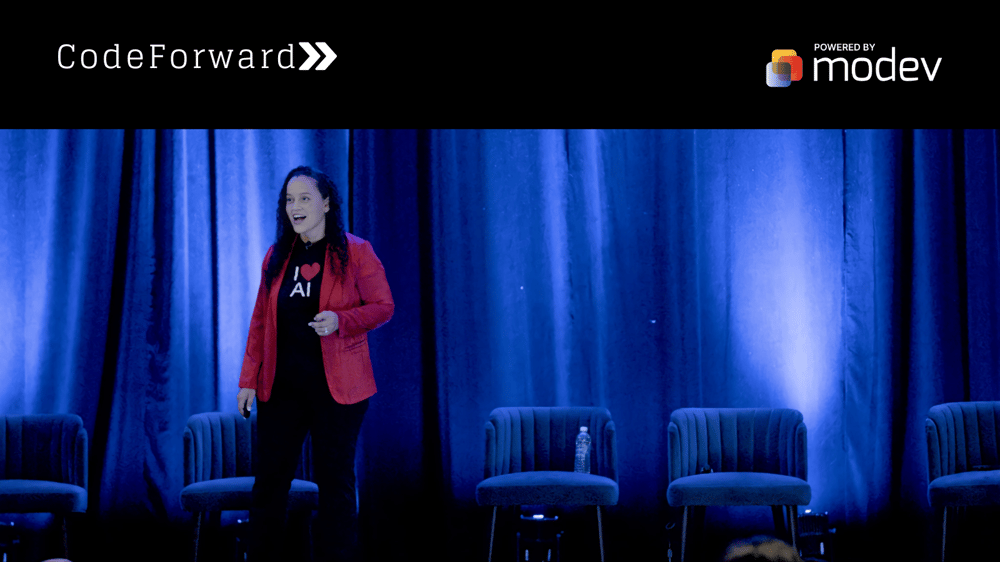Building Responsible AI Solutions at Scale with Noelle Russell
Modev News 24-03-19 Modev Staff Writers 3 min read

At CodeForward 2023, we were thrilled to be joined by none other than Noelle Russel, founder of the AI Leadership Institute. With her infectious enthusiasm and deep expertise, Noelle is a seasoned technologist and mother of six who's been navigating the tech world with a purpose-driven approach. Her journey in tech began during the Y2K era, and she's been a force to reckon with ever since, from her early days at IBM to her groundbreaking work with Amazon Alexa, Accenture, and Microsoft's democratized AI initiatives.
In her talk, Noelle shared her highly informed insights on building AI solutions that are powerful but also responsible and ethical, even when scaled to meet the demands of today's biggest brands.
People Must Build AI for People
It is important to build AI with a conscience. Noell’s son, Max, was born with Down syndrome, and his birth propelled her to leverage technology to create a more inclusive world. This powerful motivation is what drives her to ensure that AI solutions are built responsibly, taking into consideration the impact they have on real lives.
Noelle's approach to responsible AI is rooted in empathy and inclusivity. AI should be designed with the end-user in mind, considering diverse needs and potential unintended consequences. To achieve that, development teams must have the proper mindset. As such, she's passionate about upskilling teams, having trained over 600 people in prompt engineering and other AI-related skills. The strategy is not just about hiring the right talent but also about fostering the right qualities in her team.
Four key qualities you can look for in team members include curiosity, empathy, technical skills, and the ability to learn by doing. A diverse team with these qualities can build AI solutions that are not only technically sound but also ethically responsible.
Design Justice & Inclusive Datasets
Another essential part of AI solutions is inclusive datasets. The data used to train AI models often determines their behavior and biases. The AI system will likely perform poorly for underrepresented groups if a dataset lacks diversity. For example, voice recognition systems trained predominantly on male voices may struggle to recognize or accurately interpret female voices, as in the early days of Amazon Alexa.
Design justice goes hand in hand with inclusive datasets. It's a framework that examines how design choices can perpetuate or mitigate social inequalities. Developers must ask critical questions about who benefits from a particular AI solution and, just as importantly, who it might disadvantage or exclude.
Noelle's emphasis on empathetic engineering was a call to action for developers to recognize their responsibility in shaping technology that touches lives. It's about ensuring that AI solutions don't just solve technical problems but also do so in a way that is fair, accessible, and respectful of all individuals. By adopting an empathetic engineering mindset, developers can create AI that functions effectively and contributes positively to society, bridging gaps rather than widening them.
On the Need for Leadership's Buy-in
What about the need for executive buy-in when building responsible AI solutions? Without a vision from the top, it's challenging to make the necessary investments in ethical AI development. Amazon Alexa is a prime example of what can be achieved when a CEO is deeply invested in an AI project. Jeff Bezos's passion for Alexa translated into a company-wide priority, ensuring the necessary resources, attention, and support were available to ensure the project succeeded. This level of commitment from the top down fostered an environment where innovation could flourish within a framework prioritizing responsible development.
In contrast, AI initiatives lacking this level of executive enthusiasm often struggle. Without a champion in the C-suite, projects can flounder due to insufficient funding, lack of strategic direction, or inadequate attention to the ethical implications of the technology. This can result in AI solutions that are technically functional but fall short of their potential to be transformative, inclusive, and beneficial to all stakeholders.
This insight remind us that those at the helm significantly influence the trajectory of AI development. Leaders who understand the profound impact of AI and are willing to invest in its ethical development can pave the way for innovations that are successful, socially responsible, and trusted by users. This kind of leadership will define the future of AI, steering it towards a path that benefits humanity as a whole.
Wrapping Up
Noelle's session was a masterclass in responsible AI development, blending technical know-how with a robust ethical framework. The message is powerful: as developers and technologists, we have the power to shape the future of AI. It's up to us to use that power wisely, building solutions that not only solve problems but also enhance lives while doing no harm.
Ultimately, Noelle's talk at CodeForward 2023 was a compelling call to action for all of us in the tech community. Her technical acumen, ethical considerations, and personal stories created a blueprint for how we can and should approach AI development. As we continue to innovate and push the boundaries of what's possible with AI, let's keep Noelle's lessons in mind. The world needs AI that's not just smart but also kind-hearted and responsible, ensuring that our technological advancements serve humanity in the best ways possible.